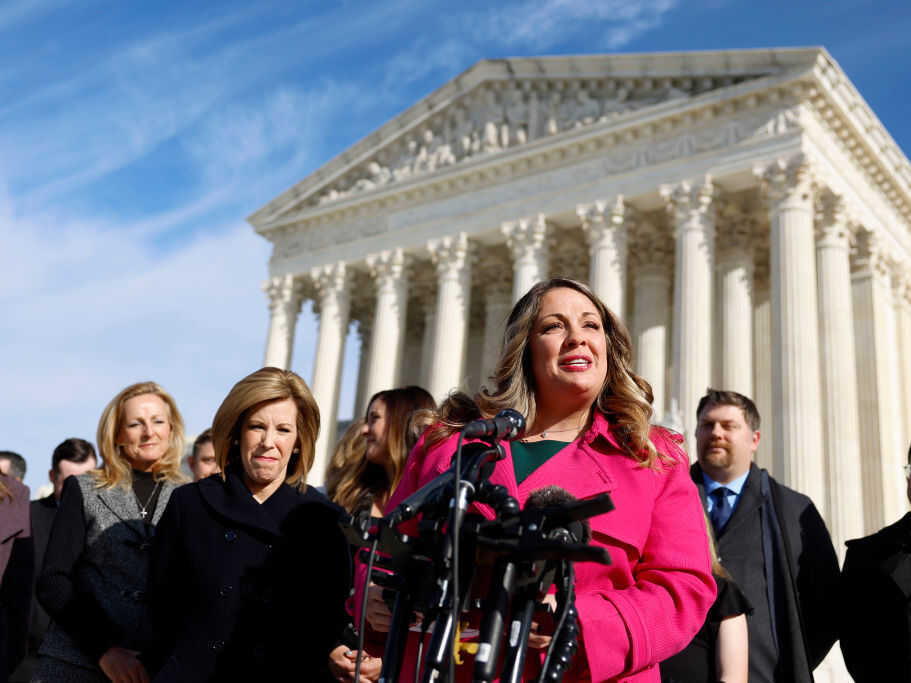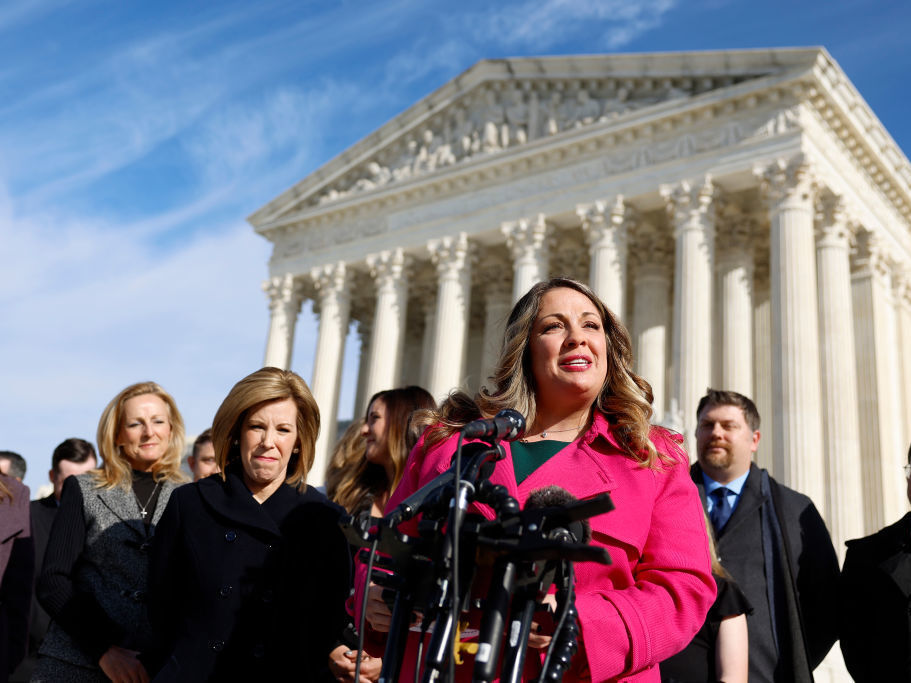Supreme Court hears case of web designer who doesn’t want to work on same-sex weddings : NPR


Lorie Smith, the operator of 303 Imaginative, a internet site structure company in Colorado, speaks Monday to reporters outside of the U.S. Supreme Court docket in Washington.
Anna Moneymaker/Getty Photographs
conceal caption
toggle caption
Anna Moneymaker/Getty Visuals

Lorie Smith, the proprietor of 303 Creative, a web site design business in Colorado, speaks Monday to reporters exterior of the U.S. Supreme Court docket in Washington.
Anna Moneymaker/Getty Photos
The U.S. Supreme Courtroom listened to much more than two hours of arguments Monday in a constitutional examination of point out community accommodations rules that safeguard same-sex couples from discrimination.
4 yrs back, the superior courtroom facet-stepped the issue in a scenario involving a Colorado baker who refused to make customized marriage ceremony cakes for similar-sexual intercourse partners. But on Monday the question was again all over again.
On a single facet is the point out of Colorado, which like 29 other states, needs corporations that are open up to the public to offer you equal accessibility to absolutely everyone, no matter of race, religion, and sexual orientation, and gender. On the other aspect are small business homeowners who see by themselves as artists and don’t want to use their skills to convey a information they disagree with.
Difficult the regulation is Lorie Smith, a custom made web designer who is opposed to similar-sex marriage. “I want to layout for weddings that are reliable with my faith,” she states.
She is pre-emptively suing Colorado simply because she believes that the condition general public lodging mandate violates her ideal of no cost speech.
Concerns from the liberal justices
In the Supreme Court docket Monday, Justices Elena Kagan, Sonia Sotomayor, and Ketanji Brown Jackson all had looked at Smith’s prepared website, which includes typical information and facts about dates, lodge lodging, marriage ceremony registry, and so on. So if she is presenting that variety of web-site to “Mike and Mary,” asked Kagan, why not the identical web-site for “Mike and Mark?”
Law firm Kristen Waggoner, symbolizing Smith, explained that would be unconstitutional compelled speech. “When you swap out people names,” she stated, “you happen to be switching out the concept and the concept.”
Sotomayor requested a problem that recurred several instances. “How about men and women who will not believe that in interracial relationship?” she preferred to know. For illustration, there could be enterprise house owners who say, “I am not likely to provide people folks due to the fact I never consider Black folks and white folks really should get married.” Would this be permissible?
Jackson requested about a hypothetical images small business recreating scenes with small children sitting on Santa’s lap at a shopping mall. The venture aims to take “nostalgia photographs,” with sepia shades that capture the feeling of the 1940s and 50s, but due to the fact “they are seeking to capture the thoughts of a specified period, their policy is that only white youngsters can be photographed with Santa.” Would that be permissable, she questioned.
Attorney Waggoner dodged and weaved, under no circumstances actually giving an solution.
Justice Alito’s hypothetical
Justice Samuel Alito, in flip, asked whether or not a Jewish photographer would have to consider photos for a Jewish client’s Ashleymadison.com profile. For the uninitiated, Ashleymadison.com is a web page for married folks who want to have affairs. Assuming this could violate the Jewish photographer’s beliefs on the sanctity of the marriage, would the photographer have to acquire images?
Alito also created on Jackson’s Santa dilemma, inquiring about a hypothetical Black Santa at the other end of the shopping mall. If, “he doesn’t want to have his image taken with a youngster who’s dressed up in a Ku Klux Klan outfit [does] that Black Santa ha[ve] to do that?”
All the justices pressed every aspect to draw a limiting line. If the court states Lorie Smith does not have to provide her expert services for exact same-intercourse weddings, then what about the baker, the jeweler, the tailor, the photographer and the caterer?
Colorado Solicitor Basic Eric Olson claimed a organization can provide any provider it needs, but that company has to be readily available to every person. A web-site can involve Christian biblical passages, and a Xmas store can sell Xmas trees, but neither can refuse to provide their product or service to Jews, or, as in this circumstance, exact-sex partners, because that would be discrimination based on racial or spiritual position.
The hypotheticals just saved coming. Justice Amy Coney Barrett asked about a newspaper that made the decision to devote its wedding ceremony section only to very same-sexual intercourse couples all through Homosexual Satisfaction thirty day period. Would that be illegal discrimination towards straight couples?
Justice Neil Gorsuch put the problem really succinctly: “Past time close to, we had cakes, as either expressing the maker’s place of view or the couple’s stage of watch. And that’s genuinely at the heart of a ton of this.”
A choice in the case is expected by summer season.


/cloudfront-us-east-2.images.arcpublishing.com/reuters/5KEKNKX4XVLVHIBQ4MLXRSTUTM.jpg)


